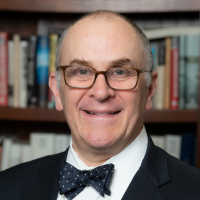Virtue & Power
Reflect on the ethical dilemmas implied by the pursuit of power.
June 27–July 1, 2022
Washington, DC
For the second week of Political Studies Program, fellows will continue their exploration of political philosophy.
Fellows will again have a choice between two seminars. One seminar will delve into the principles of political rhetoric – both what it is and what its potential virtues and vices may be. Fellows will study classic examples of rhetoric and contemporary political speeches, with a view toward understanding the interrelationship between political rhetoric and emotions, and how these connections can be both useful and dangerous, especially for democracies. Our second seminar will examine two Shakespearean plays – King Lear and The Tempest – and what they reveal about the political themes of ambition and honor, love and friendship, rulers and usurpers.
Image Credit: Gustav Klimt, Pallas Athena, 1898
Robert C. Bartlett on Aristotle's Guide to the Good Life
This course is part of our residential Political Studies Program. Fellows participate in morning seminars and meet prominent men and women in public life over afternoon and evening sessions. Up to 36 fellows will be selected.

Robert C. Bartlett is the Behrakis Professor of Hellenic Political Studies at Boston College. His principal area of research is classical political philosophy, with particular attention to the thinkers of ancient Hellas, including Thucydides, Plato, and Aristotle. He is the co-translator of a new edition of Aristotle’s Nicomachean Ethics.

Robert C. Bartlett is the Behrakis Professor of Hellenic Political Studies at Boston College. His principal area of research is classical political philosophy, with particular attention to the thinkers of ancient Hellas, including Thucydides, Plato, Xenophon, and Aristotle.
He is the author or editor of eight books, including Sophistry and Political Philosophy: Protagoras’ Challenge to Socrates, The Idea of Enlightenment, Plato’s Protagoras and Meno, and Xenophon’s The Shorter Socratic Writings. He is also the co-translator of a new edition of Aristotle’s Nicomachean Ethics (University of Chicago Press, 2011). He has also published articles in the American Political Science Review, American Journal of Politics, Journal of Politics, Review of Politics, and other leading scholarly journals.
Before coming to Boston College, Robert Bartlett served as the Arthur M. Blank/National Endowment for the Humanities Distinguished Teaching Professor at Emory University. He is a graduate of the University of Toronto and holds an MA in Classics and a Ph.D. in Political Science from Boston College.

Mary P. Nichols is Professor Emerita of Political Science at Baylor University. She is author of Thucydides and the Pursuit of Freedom, and Socrates on Friendship and Community: Reflections on Plato’s Symposium, Phaedrus, and Lysis. She has delivered lectures on ancient political theory, Shakespeare, and film.

Mary P. Nichols is Professor Emerita of Political Science at Baylor University. She is author of Thucydides and the Pursuit of Freedom, and Socrates on Friendship and Community: Reflections on Plato’s Symposium, Phaedrus, and Lysis. Her published works include a study of directors Woody Allen, John Ford, and Alfred Hitchcock, as well as investigations into the works of ancient political philosophers including Plato, Aristotle and Thucydides.
Professor Nichols has not only published articles in American Political Science Review, the Review of Politics, and Perspectives on Political Science, but she also serves on their editorial boards. She has delivered lectures on ancient political theory, Shakespeare, and film, and she is a senior fellow at the Alexander Hamilton Institute. She has also taught at Fordham University, the University of Delaware, and St. John’s College Annapolis. Professor Nichols received her Ph.D. from University of Chicago, her M.A. from Kansas University, and her B.A. from Tulane University.
Readings:
Epideictic Rhetoric
Judicial Rhetoric
Deliberative Rhetoric
Discussion Questions:
Readings:
On Pathos
On Ethos
On Logos
Discussion Questions:
Readings:
Rhetoric & Style
Rhetoric in Times of Crisis & Doubt
Discussion Questions:
Readings:
Discussion Questions:
Readings:
Readings:
Discussion Questions:
Readings:
Discussion Questions:
Readings:
Discussion Questions:
Readings:
Discussion Questions:
Readings:
Discussion Questions:

Ryan Patrick Hanley
Ryan Patrick Hanley is Professor of Political Science at Boston College. His research in the history of political philosophy focuses on the Enlightenment. He is the author of Our Great Purpose: Adam Smith on Living a Better Life and Love’s Enlightenment: Rethinking Charity in Modernity.

Benjamin Storey
Benjamin Storey is a senior fellow in Social, Cultural, and Constitutional Studies at the American Enterprise Institute (AEI), and co-director of AEI’s Center for the Future of the American University. He is concurrently an SNF Agora Fellow at Johns Hopkins University and a research fellow at the Civitas Institute at the University of Texas at Austin.

Jacob Howland
Jacob Howland has published five books and roughly 60 scholarly articles and review essays on the thought of Plato, Aristotle, Xenophon, Kierkegaard, the Talmud, the Holocaust, ideological tyranny, and other subjects. His most recent book is Glaucon’s Fate: History, Myth, and Character in Plato’s Republic.

Eliot Cohen
Eliot Cohen is the Robert E. Osgood Professor at the Johns Hopkins University’s School of Advanced International Studies (SAIS) where he has taught since 1990. He served as Dean of SAIS from 2019 to 2021. In addition to public service in the Department of Defense he served as Counselor of the Department of State from 2007 to 2009.

Vickie Sullivan
Vickie Sullivan is the Cornelia M. Jackson Professor of Political Science and teaches and studies political thought and philosophy. She also maintains teaching and research interests in politics and literature. She has published extensively on Montesquieu and Machiavelli and is the co-editor of Shakespeare’s Political Pageant.

Robert C. Bartlett
Robert C. Bartlett is the Behrakis Professor of Hellenic Political Studies at Boston College. His principal area of research is classical political philosophy, with particular attention to the thinkers of ancient Hellas, including Thucydides, Plato, and Aristotle. He is the co-translator of a new edition of Aristotle’s Nicomachean Ethics.

Bryan Garsten
Bryan Garsten is Professor of Political Science at Yale University. He writes on questions about political rhetoric and deliberation, the meaning of representative government, the relationship of politics and religion, and the place of emotions in political life.